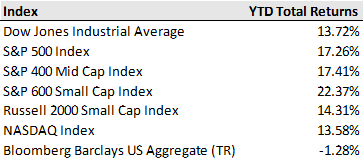Stock market turbulence continued last week with U.S. equities sliding lower as a back-up in long-term interest rates hit high growth technology stocks and investors continued to assess new developments on financial stress in China as well as the gridlock in Congress. For the week, the Dow Jones and S&P 500 lost 1.4% and 2.2%, respectively, while the tech-laden Nasdaq Composite tumbled 3.2%. The equity market volatility has carried into this week’s early trading with the S&P 500 now down just over 5% off its all-time high, the first drawdown of over 5% since October of last year, when markets were grappling with the uncertainty of the presidential election.
The sell-off in technology stocks over the last week has in part been driven by rising yields as the 10-year Treasury yield pushed as high as 1.58% last week, rising over 0.25% over the course of 7 days, before easing lower and closing out Friday at about 1.46%. One of the factors underpinning yields has been a broad-based surge in commodity prices as the Bloomberg Commodity Index pushed to a record high on Monday. Energy, agricultural commodities, and metals have all contributed to the surge.
In China, while contagion concerns from the failure of China Evergrande Group seemed to ebb last week, the issue was brought back into focus after reports of missed debt payments totaling $466 million on Monday by two other Chinese real estate companies, with one of the loans potentially guaranteed by Evergrande. In response, Beijing has indicated it is unlikely to bail out distressed issuers but has ramped up its efforts to limit the fallout from their failures with its main priorities to ensure bills to suppliers get paid, home buyers get their apartments, and workers get their paychecks, at the expense of global stock and bondholders in the companies. Chinese officials may also seek to increase liquidity to credit markets to avoid a credit crunch.
Domestically, discord in D.C. has stolen the show as the debt ceiling standoff remains at an impasse. Republicans have stated that Democrats will need to go it alone and pass the debt ceiling increase through reconciliation, while Democrats have been reluctant to take unilateral measures. According to Treasury Secretary Janet Yellen, the issue must be resolved by October 18th, which is the date when the Treasury will run out of extraordinary measures to pay the country’s bills.
Despite the recent increase in volatility and the continued stream of headlines discussing China, Congress, and supply chain challenges, there remain some strong tailwinds moving in support of equity markets as well. Liquidity remains a common theme throughout bullish arguments as corporations have capacity to increase dividends and share buybacks, consumers are still sitting on excess savings to support sustained strength in demand (despite tapering fiscal support), and equity markets remain a large beneficiary of financial market inflows with rates still at low real levels. Additionally, Covid trends have improved notably with Dr. Fauci recently saying that the U.S. has turned the corner on the Delta surge with last week’s daily cases down by over 30% off the highs seen a month ago.
In the week ahead, the big news on the economic front will be the September employment report, following the disappointing results from August. The consensus expectations are for 500k jobs to have been added in September, up from 235k in August, as enhanced unemployment benefits expired after Labor Day. The report will be a crucial input for the Federal Reserve as they move toward tapering bond purchases and easing accommodation likely starting at the November meeting.



